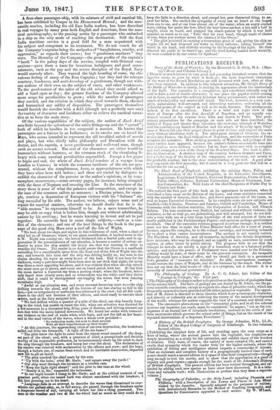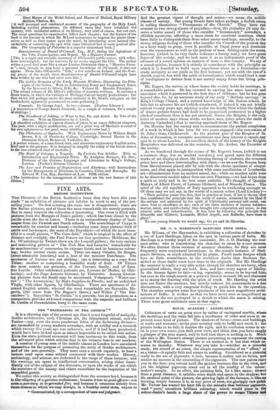PUBLICATIONS RECEIVED.
Story of the Battle of Waterloo. By the Reverend G. IL Gleig, MA. (Mur- ray's Home and Colonial Library.) [There is so much interest in very great and governing historical events, that the
appetite seems to grow by what it feeds on: the more important campaigns of the wars of the French Revolution are still devoured with zest, often as they have been narrated. In addition to this inherent attraction, Mr. Gleig's Story of the Battle of Waterloo is timely, in making its appearance about the anniversary of the fight. The narrative is a compilation, and considered critically may be said to have a sort of double character; in one place the popular writer coming out in force, in another the military historian being predominant, with rather too much of technicality and muster-roll detail. The book, however, is a very com- plete, painstaking, well-arranged, and interesting narrative, embracing all the collateral points of the subject as well as its main features. The arrangement, indeed, is its first excellence. There' is a brief and rapid view of the state of Europe after the first downfall of Napoleon, and an equally con- densed account of his evasion from Elba and march to Paris. The preli- minary preparations for the campaign on each side are then described; the battles of Ligny and Quatre Bras introduce the crowning triumph of Waterloo; and the contemporary march of Blucher and the attack of Grouchy upon Thiel- man at Wavre fall into their proper places in point of time, and support the main story without interfering with it. The subsequent retreat of Grouchy, the en- trance into France, the final abdication of Napoleon, and the convention of Paris complete the narrative. More striking accounts of Waterloo, and perhaps of the other battles have appeared, because the author's fulness occasionally runs into over-detail on mere military matters; but we have never met with so complete and well-arranged a view of the Story of the Hundred Days. The book is defec- tive in illustration. A skeleton map of the country between Brussels and Paris, and a fuller map of the locality of the campaigns, are necessary, not merely to the profitable reading, but to the clear understanding of the text. A good atlas may supersede the first necessity, but it must be a very good ono that will be a substitute for the second.]
7'he Black Book of England; exhibiting the existing State, Policy, and Administration of the United Kingdom, in its Executive Government, Legislature, Established Church, Electoral Representation, Courts of Law, Public Offices, Colonies, National Universities, House of Commons, Lon- don Corporation, &c. With Lists of the thief Recipients of Public Pay in Church and State.
[We noticed the first part of this book on its appearance in numbers, when it contained a long essay on the Reform of the Laws' and some statistics connected with the number of lawyers, their fees, and direct payments out of the taxes, as well as began Executive Government. In its complete state six new subjects are handled,—the Colonies, Pensions and Salaries, Oxford and Cambridge, House of Commons with the election statistics the Corporation of London, and Church Reform. The tone continues very Radical, but rational and without violence; the statistics, so far as they go, are painstaking, and well arranged, but do not indi- cate a very wide use or a very large knowledge of the vast amount of facts an- nually published in the Parliamentary Papers; and opinions perhaps predominate too much. One of the executive reforms proposed is curious enough: it is neither more nor less than to make the Prime Minister hold office for a term of years; because, argues the compiler, he is the virtual sovereign, and remaining monarch for so short a time causes inconvenience. The analogy is not exactly correct. The President of America, and all monarchs, including the Asiatic despotisms, have ministers, who may be changed, and as rapidly as ours, sometimes by court caprice, at other times by public outcry. The proposer fails to see that the changes be bewails are merely a sign of a transition state or a balanced public opinion; and unless the powers of l'arliament were handed over to the Premier, nothing would be done, or there must be the grossest corruption. An incapable Ministry would have a lease of office, and we should get back to a permanent fool's paradise of "measures for rejection." An able, unscrupulous manager, would restore the times of Walpole, and do his business by the touch. The writer does not see that the brief tenure of office is a symptom, not a disease: it is a necessity of constitutional government.]
The Philosophy of Geology. By A. C. G. Jobert, late Editor of the 'Journal de eeologie," &c. First part.
[The Philosophy of G eology is rather a disquisition on the theories of geologists than on the science itself. The facts of geology are not denied by M. Jobert, nor the ge- neral scientific conclusions, except as regards the class of primitive rocks, which are frequently assumed to have preceded all life either animal or vegetable. The opposi- tion of M. Jobert is directed to those theories which have a cosmogonic character, and directly or indirectly aim at enforcing the theory of the natural development of the world; whereas the author supports the view of a constant and direct crea- tion. The successive pbsenomena on the "terrestrial globe, and mall the sidereal systems our inquiries can reach, must be considered," he argues, "not as the con- sequence of an eternal law of invariable revolutions, enclosed in the circle of uni- form movements which governs the actual order of things, but as the result of the repeated interventions of a Supreme Providence."] A History of the British Zoophytes. By George Johnston, M.D., LL.D., Fellow of the Royal College of Surgeons of Edinburgh. In two volumes. Second edition.
[Exhibiting the simplest form of life, and standing upon the very verge as it were of being, where the animal passes into the vegetable, the zoophytes are deeply interesting as a study for the naturalist, and exhibit many of the wonders of creation. They want, of course, the variety of more complex life, and cannot excite that sympathy which the reader feels for the higher animals, where the exhibition of feeling and intelligence almost imparts a community of interest. That an elaborate and complete history of a geographically limited class of such a race should reach a second edition in a space of time brief comparatively—though long enough to test the merits, and to show that the approbation is a proof of inquiry and good repute—speaks enough for the merit of Dr. Johnston's History of British Zoophytes. The present edition has been revised throughout, and ex- tended by adding such new species as have since been discovered. It is a labo- rious and valuable work; with illustrations so profuse that they form a separate volume.] The Geography of Palestine, or Me Holy Land; including Phcenicia and Philistia: with a Description of the Towns and Places in Asia Minor visited by the Apostles. Specially adapted to the purposes of tuition; with Introductory Remarks on the Method of Teaching Gwgraph y, and Questions for Examination appended to each section. By W. hrLeod.
Head Master of the Model School, and Master of Method, Royal Military Asylum, Chelsea, &o.
LA well arranged and condensed account of the geography of the Holy Land, naclading natural phtenomena, the different races that have inhabited the country, with incidental notices of its history, very brief of course, but not curt. The usual qaestions for examination follow each chapter; but the feature of the book is the manner in which Mr. lIPLeod endeavours to impress the places them- selves as well as their names upon the mind, by introducing some natural cha- racteristic, or connecting the spot with some historical fact or some poetical allu- sion. The Geography of Palestine is a superior elementary book.] Reminiscences of Daniel O'Connell, Esq., M.P., during the Agitations of the Veto, Emancipation, and RepeaL By a Munster Farmer. [This is a rapid and readable summary of O'Connell's public career, with reflec- tions intermingled; but the contents by no means support the title. The author writes a good deal more like a smart London littemteur than a "Monster Farm- er"; and, though he may have a personal knowledge of O'Connell, it does not appear. From John O'Connell's "Life," a few articles on Ireland, and the float- ing gossip of the world, these Reminiscences of Daniel O'Connell might have been written by one who had never seen him."
The Golden Remains of the Early Masonic Writers; illustrating the Prin-
ciples of the Orders. With an Introductory Essay and Explanatory Notes,
by the Reverend G. Oliver, D.D., &c. Volume IL Masonic Principles. [The second volume of Dr. Oliver's collection of masonic writings. It contains a dozen tracts, in which the writings of Wellings Calcott largely predominate; but that which will perhaps excite the most curiosity is Dr. Dodd's eulogium on the brotherhood, apparently pronounced at some gathering.] Consuelo. By George Sand. In two volumes. (Parlour Library.) [A translation of George Sand's Consuelo, in a couple of volumes, for a couple ehillings.] 77ie Handbook of Joking; or What to Say, Do, and Avoid. By Two of the Joceses. With an Illustration by J. Leech.
LA classified exhibition of sixteen classes of jokes, in as many different chapters. Moja*, with a slight modification, are not a great way off Martial's account of his own epigrams—a few good, many middling, and some bad.]
The Philoctetes of Sophocles. With Explanatory Notes by William Haigh Brown, B.A. of Pembroke College, Cambridge; Second Master in the Grammar School, Richmond, Yorkshire, &c.
LA pocket volume, of a neat Greek text, and numerous explanatory English notes, kief'and to the purpose. It is designed to simplify the study of the Greek drama to the less advanced class of students.]
The Maid of Orleans; a Tragedy. By Frederic Von Schiller. With an Introduction and Explanatory Notes. By Adolphus Bernays Ph. Doc., Professor of the German Language and Literature in King's College, London. (Parker's German Classics.) The Law and Practice of Registration and Elections; with Instructions for the Management of Elections, in Counties, Cities, and Boroughs. By Edward W. Cox, Esq., Barrister-at-Law. Fifth edition.
(This instructions for the management of elections are the new feature of this edition.'



























 Previous page
Previous page